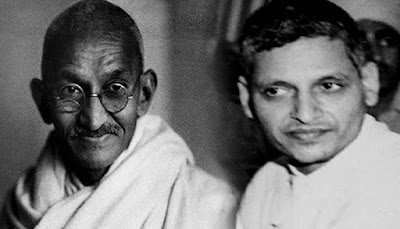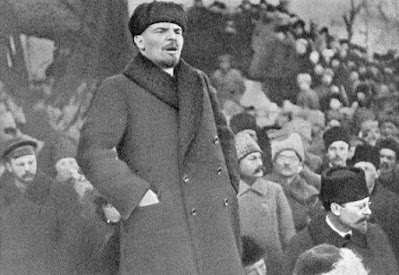"Terrorism and deception are weapons not of the strong but of the weak." - Mohandas K. Gandhi
"We are ruthless and ask no quarter from you. When our turn comes we shall not disguise our terrorism." - Karl Marx, Marx-Engels Gesamt-Ausgabe, vol. vi pp 503-5 (The final issue of Neue Rheinische Zeitung, 18 May 1849)
 |
| Mohandas K. Gandhi and his assassin Nathuram Godse. |
“In politics you cannot follow nonviolence. You cannot follow honesty. Every moment you have to give a lie. Every moment you have to take a bullet in hand and kill someone.” - Gopal Godse, co-conspirator in Gandhi's assassination, Time Magazine, February 2000.
Seventy six years ago Mohandas Gandhi was shot three times in the chest and killed by Hindu nationalist Nathuram Godse at 5:17pm. Godse was part of a team of assassins that had tried 10 days earlier to bomb and kill Gandhi.
 |
| Body of Indian leader Mahatma Gandhi lies in state at Birla House in New Delhi. |
Gandhi despite his successful struggle for independence and the establishment of the largest democracy on the planet was felled, after repeated assassination attempts, gunned down as he went to worship.
The assassins murdered the independence leader because they did not believe that India could survive with Gandhi promoting Satyagraha and a Muslim state next door. Gopal Godse, a co-conspirator and brother of the assassin Nathuram Godse, argued as late as February 2000 in a Time magazine interview that: “In politics you cannot follow nonviolence. You cannot follow honesty. Every moment you have to give a lie. Every moment you have to take a bullet in hand and kill someone.”
Although Gandhi regarded the union and independence of the Indian peoples as his goal, his reactionary-Utopian social theory and the reformist methods of struggle connected with it caused his activity to fail in facilitating overthrow of the colonial yoke [...] The social essence of the Gandhi doctrine and its fundamentally reactionary role in the history of India's national liberation movement has hardly been treated in Marxist literature. Yet this doctrine still retards the development of class awareness among the Indian masses.What was this social essence of Gandhian thought that so troubled the Marxist-Leninists in the Soviet Union? First, the reformist methods of struggle referred to in the above quote was nonviolent resistance and secondly his social theory rejected class struggle as another manifestation of destructive violence. On September 11, 1906 a new word came into existence that would give a better understanding of Gandhi's social theory and method of struggle which he described as:
'Satyagraha.' Truth (Satya) implies love, and firmness (agraha) engenders and therefore serves as a synonym for force. I thus began to call the Indian movement 'Satyagraha,' that is to say, the Force which is born of Truth and Love or non-violence, and gave up the use of the phrase 'passive resistance,' in connection with it, so much so that even in English writing we often avoided it and used instead the word 'Satyagraha' itself or some other equivalent English phrase.The Marxist-Leninists embrace revolutionary violence and a movement led by a small vanguard of intellectuals and professional revolutionaries that carry out the changes "necessary" by whatever means necessary and reject nonviolence as naive. They follow the doctrine of Vladimir Lenin as presented in his 1902 revolutionary tract "What is to be done."
Over a century has passed since both sets of ideas have been set out and applied around the world. An analysis done by Maria J. Stephen and Erica Chenoweth systematically explores the strategic effectiveness of both violent and nonviolent campaigns using data on 323 campaigns carried out between 1900 and 2006.[1] Their findings demonstrate that major non-violent campaigns were successful 53% of the time versus only 26% for major violent campaigns and terrorist campaigns had a dismal 7% success rate.
"The socialists and communists say, they can do nothing to bring about economic equality today. They will just carry on propaganda in its favor and to that end they believe in generating and accentuating hatred. They say, when they get control over the State, they will enforce equality. Under my plan the State will be there to carry out the will of the people, not to dictate to them or force them to do its will." - Mohandas Gandhi
"It is my firm conviction that if the State suppressed capitalism by violence, it will be caught in the coils of violence itself, and will fail to develop non-violence at any time. The State represents violence in a concentrated and organized form. The individual has a soul, but as the State is a soulless machine, it can never be weaned from violence to which it owes its very existence." - Mohandas Gandhi
It is Satyagraha that is relevant today in 2022 and offers an alternative to the conflagrations suffered in the 20th century and the wars that plague the world now. Gandhi's Satyagraha is a call to principled non-violence but even pragmatists and realists looking over the historical record cannot fail to be influenced by the fact that non-violent civic resistance works and offers a better chance of a better life for more people.
 |
| The author in Geneva, Switzerland paying his respects to Bapu. |
His example has inspired me to commit to nonviolent strategic resistance as a method of struggle, and others have also embraced his legacy, and that of one of his disciples, Martin Luther King Jr., to observe their death anniversaries of January 30, 1948 and April 4, 1968 as a Season of Nonviolence, a time for right action.
Arun Gandhi, the grandson of Mohandas Gandhi, founded the Season of Nonviolence in 1988 as an annual celebration honoring the philosophies and lives of Martin Luther King Jr. and Mohandas Gandhi. Dr. Michael Beckwith assisted in the development of this initiative.2024 marks 36 years of this observance. Over 174 days on a weekly basis there will information highlighting the nonviolent philosophies of Gandhi, King, and Oswaldo Payá .
A 2018 documentary by Deutsche Welle about the assassination of Mohandas Gandhi is available online. It is also available in Spanish.
There are many disciples of Gandhi and King that have continued their good works around the world.
Oswaldo Payá Sardiñas, a non-violent icon born in Havana, Cuba on February 29, 1952 who's compatriots lovingly called him "Bapu" is one of them.
Oswaldo Payá Sardiñas spent his entire adult life defending the human rights of the Cuban people. He founded the Christian Liberation Movement (MCL) in 1988 and used nonviolent means to demand that human rights be respected in Cuba. He mobilized tens of thousands of Cubans through the Varela Project on the need for a democratic transition. However, he did not only focus on the human rights violations of the Castro regime and consistently defended human rights in stark contrast to the current government in Oswaldo's homeland.
Two instances separated by a decade involving the United States and Iran
demonstrate this courageous consistency in speaking truth to power.
On January 12, 2002, the Cuban Communist Party's daily newspaper Granma offered the official position of the dictatorship on the prison camp in Guantanamo:
"We will not create any obstacles to the development of the [U.S.
military] operation, though the transfer of foreign prisoners of war by
the U.S. government to the base—located on a space in our territory
upon which we have been deprived of any jurisdiction—was not part of
the agreement that the base was founded upon."
The first Cuban
on the island to criticize and denounce the United States for housing Afghan
prisoners in Cuba and demanding they be treated with dignity was Cuban opposition leader Oswaldo Payá Sardiñas on December 17, 2002:
"It's obviously a matter of shame that our land is being used for that purpose, having foreign prisoners brought to Cuba. Even if they are terrorists, they deserve respect. Their human rights should be respected."
Ten years later, on January 11, 2012, Oswaldo Payá was criticizing the honoring of the Iranian despot Mahmoud Ahmadinejad, denouncing both his antisemitism and brutal human rights record:
"Tyrant lizard on the hill. Currently, Ahmadinejad speaks at the University of Havana. It is an insult to the students and an outrage to the sacred remains of Father Varela, and against the virtue and homeland of the Cubans."
"Mahmoud, why do you deny the Holocaust? Would you repeat it? Never again against any people."
Twelve years ago on July 22, 2012 this consistent human rights defender was killed in what was a premeditated state security operation that led to the car crash, together with the killing of MCL youth leader Harold Cepero Escalante. Over the past decade his family and friends have demanded an investigation into these two deaths, and in June 2023 the Inter-American Commission on Human Rights confirmed that the two human rights defenders had been assassinated by Cuban government agents.
The hatred and violence promoted by communists and ultra-nationalists only end in death and destruction, but time has also demonstrated the constructive power of love and nonviolence. On this Martyr's Day lets us remember Gandhi, King, and Payá and their constructive nonviolent legacies that decade later continue to have positive results.
Over the next 64 days this site will be highlighting some of them.



















